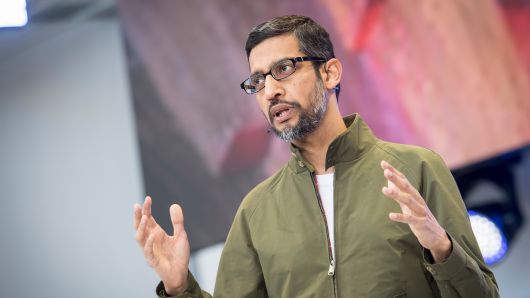
David Paul Morris | Bloomberg | Getty Images
Sundar Pichai, chief executive officer of Google Inc., speaks during the Google I/O Developers Conference in Mountain View, California, U.S., on Tuesday, May 8, 2018.
Let’s get this out of the way first: There is no basis for the charge that President Trump leveled against Google this week — that the search engine, for political reasons, favored anti-Trump news outlets in its results. None.
Mr. Trump also claimed that Google advertised President Barack Obama’s State of the Union addresses on its home page but did not highlight his own. That, too, was false, as screenshots show that Google did link to Mr. Trump’s address this year.
But that concludes the “defense of Google” portion of this column. Because whether he knew it or not, Mr. Trump’s false charges crashed into a longstanding set of worries about Google, its biases and its power. When you get beyond the president’s claims, you come upon a set of uncomfortable facts — uncomfortable for Google and for society, because they highlight how in thrall we are to this single company, and how few checks we have against the many unseen ways it is influencing global discourse.
In particular, a raft of research suggests there is another kind of bias to worry about at Google. The naked partisan bias that Mr. Trump alleges is unlikely to occur, but there is a potential problem for hidden, pervasive and often unintended bias — the sort that led Google to once return links to many pornographic pages for searches for “black girls,” that offered”angry” and “loud” as autocomplete suggestions for the phrase “why are black women so,” or that returned pictures of black people for searches of “gorilla.”
I culled these examples — which Google has apologized for and fixed, but variants of which keep popping up — from “Algorithms of Oppression: How Search Engines Reinforce Racism,” a book by Safiya U. Noble, a professor at the University of Southern California’s Annenberg School of Communication.
Dr. Noble argues that many people have the wrong idea about Google. We think of the search engine as a neutral oracle, as if the company somehow marshals computers and math to objectively sift truth from trash.
More from The New York Times:
Every Generation Gets the Beach Villain It Deserves
Customers Died. Will That Be a Wake-Up Call for China’s Tech Scene?
Too Many Chinese Children Need Glasses. Beijing Blames Video Games.
But Google is made by humans who have preferences, opinions and blind spots and who work within a corporate structure that has clear financial and political goals. What’s more, because Google’s systems are increasingly created by artificial intelligence tools that learn from real-world data, there’s a growing possibility that it will amplify the many biases found in society, even unbeknown to its creators.
Google says it is aware of the potential for certain kinds of bias in its search results, and that it has instituted efforts to prevent them. “What you have from us is an absolute commitment that we want to continually improve results and continually address these problems in an effective, scalable way,” said Pandu Nayak, who heads Google’s search ranking team. “We have not sat around ignoring these problems.”
For years, Dr. Noble and others who have researched hidden biases — as well as the many corporate critics of Google’s power, like the frequent antagonist Yelp — have tried to start a public discussion about how the search company influences speech and commerce online.
There’s a worry now that Mr. Trump’s incorrect charges could undermine such work. “I think Trump’s complaint undid a lot of good and sophisticated thought that was starting to work its way into public consciousness about these issues,” said Siva Vaidhyanathan, a professor of media studies at the University of Virginia who has studied Google and Facebook’s influence on society.
Dr. Noble suggested a more constructive conversation was the one “about one monopolistic platform controlling the information landscape.”
So, let’s have it.
 EU News Digest Latest News & Updates
EU News Digest Latest News & Updates



